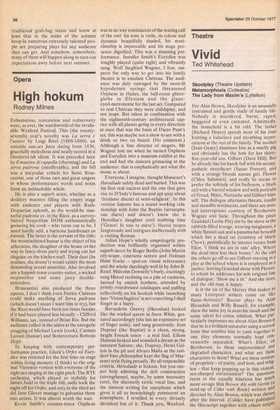Opera
High hokum
Rodney Milnes
Exhumation, restoration and rediscovery were, as ever, the watchwords of the invaluable Wexford Festival. This (the twentyseventh) year's novelty was La serva e l'ussero by Luigi Ricci (1808-1860), an amiable one-act farsa dating from 1836, gracefully melodious and neatly scored in i Donizetti-ish idiom. It was preceded here by Ii maestro di cappella (charming) and La serva padrona (insufferable), and the bill was a tricycnlar vehicle for Sesto Bruscantini, one of those rare and great singers in whose performances words and notes form an indissoluble whole.
He is also a superb actor, whether as a doddery maestro filling the empty stage with audience and players with RuthDraperian aplomb, as the would-be masterful padrone or, in the Ricci, as a carrotyhaired Neapolitan DOM enthusiastically goose ing his cook — who turns out to be, I need hardly add, a baritone hairdresser en travesti. The latter is the servant of the title; the moustachioed hussar is the object of his affections, the daughter of the house on her way to fancy-dress party and trying out her disguise on the kitchen staff. Their duet (he realises, she doesn't) would satisfy the most demanding sexual anarchist. Also involved are a foppish tenor counter-suitor, a wicked stepmother and some juicy doubleentendres.
Bruscantini also produced the three operas. I don't think even Patrice Chereau could make anything of Serva padrona (which doesn't mean I want him to try), but the Ricci would have been ten times funnier if it had been played less broadly — Clifford Williams, say, instead of Brian Rix. But the audience rolled in the aisles at the energetic mugging of Michael Lewis (cook), Carmen Lavani (hussar) and Bonaventura Bottone (fop).
In keeping with contemporary performance practice, Gluck's Orfeo ed Eurydice was restored for the first time on stage within living memory (I think) to the original Viennese version with everyone of the right sex singing at the right pitch. The RTE orchestra, which played so stylishly for James Judd in the triple bill, sadly took the night off for Orfeo, and only in the third act did Jane Glover manage to galvanise them into action. It was almost worth the wait.
Kevin Smith's counter-tenor Orpheus was in no way reminiscent of the mating call of the owl: his tone is virile, its colour and dynamic beautifully shaded, his musicianship is impeccable and his stage presence dignified. This was a stunning performance. Jennifer Smith's Eurydice was toughly played (quite right) and vibrantly sung. Wolf Siegfried Wagner, I fear, suspects the only way to get into his family theatre is to emulate Chereau. The audience was duly outraged by the neon-lit hypodermic syringe that threatened Orpheus in Hades, the ball-room glitterglobe in Elysium and the gianteyed-metronome for the last act. Compared to real Chereau they were childsplay, and not inapt. But taken in combination with the eighteenth-century architectural caprice with all planes going in every direction at once that was the basis of Dacre Punt's set, this was maybe not a show to see with a drink or two on board. (No comment.) Although a fine director of singers, Mr Wagner lost me when he turned Orpheus and Eurydice into a museum exhibit at the end and had the dancers grimacing at the audience: that is emphatically not what the music is about.
Everyone, I imagine, thought Massenet's Herodiade safely dead and buried. This was his first real success and the one that gave rise to D'Indy's famous and apt quip about ‘erotisme discret et semi-religieux'. In this version Salome has a sound working relationship with John the Baptist (scrumptu. ous duets) and doesn't know she is Herodias's daughter until stabbing time (`Grace! Je suis ta mere). Herod mopes langorously and intrigues ineffectually with a visiting Roman.
Julian Hope's wholly unapologetic production was brilliantly organised within superb decor by Roger Butlin (John Martin city-scape, cinerama screen and Holman Hunt frocks — spot-on visual references) and the whole dazzlingly well lit by John B. Read. Malcolm Donnelly's burly, excitingly sung Herod reclining on a pile of cushions, fanned by ostrich feathers, attended by primly overdressed odalisques and puffing reflectively on his hookah while launching into 'Vision fugitive' is not something I shall forget in a hurry.
Bernadette Greevy (Herodias) looked like the wicked queen in Snow White, gestured accordingly (she has an expressive set of finger nails), and sang generously. Jean Dupouy (the Baptist) is a clean, strong, bright French tenor — a real find. Eilene Hannan looked and sounded a dream as the innocent Salome; she, Dupouy, Henri Gallois in the pit and Alvaro Malta as the resident bass philosopher kept the flag of Massenet style flying proudly. By all responsible criteria, Herodiade is hokum, but you cannot help admiring the deft construction (strengthened, maybe, by some necessary cuts), the discreetly erotic vocal line, and the sinuous writing for saxophone which gives it all so bewitchingly putrescent an atmosphere. I revelled in every divinely decadent bar of it. Thank you, Wexford.


































 Previous page
Previous page